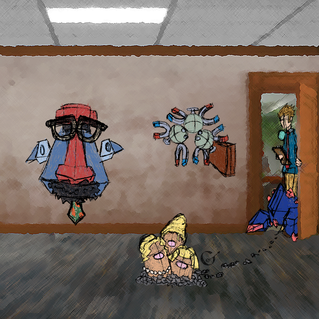 As I have been growing up I have noticed that my weekly schedule seems very busy. Mondays I catch up with Monica, Wednesdays I have date night with my husband, and Fridays I watch the Nimbasa City Strikers. Every week, I have the same routine scatterbugged with meetings and social gathering here and there. My personal finances also have a weekly routine that lock-on to four different weekly events. Each week I schedule payments, check my checking account, purchase date night’s dinner and buy groceries.
3 Comments
 For the last two months, I have been attempting to discuss with my boss that I wanted to apply and replace my supervisor’s position. I felt as though I had a clear understanding of what the job is, what kind of commitment it requires and I could return 5 years company related experience back into the position. However, I needed to overcome my intimidation before I could talk to her. A widely held belief is that fear prevents us from reaching our goals. But, what about those situations when we have captured our fear but can’t seem to use that power yet? I consider intimidation is a feeling of not being afraid to move forward, but still feeling trapped behind an invisible wall, or light screen, that needs to brick broken through. Even when I don’t feel paralyzed, intimidation still weakens my attack power making it harder for me to accomplish my goals.  Lifestyle inflation is the process of how we adjust our spending when we suddenly have more money than we are accustomed to. Although lifestyle inflation can be handled responsibly, most of the time people refer to it as reckless spending and the habits created. I get it. It feels great to be able to reward ourselves by allowing us to do the things we deprive ourselves of. Buying lunch while at work, purchasing a new tv or even getting a massage in Veilstone City. If we don’t catch it early, these little rewards become part of our everyday lifestyle and can slowly damage our finances like a sand tomb. We are going to run into lifestyle inflation no matter what, and it is our job to prepare for it. Back in September, I received a $3/hour raise with the requirement to work a 40 hour week. This gave my weekly paychecks an approximate $100 boost, after taxes. Having an additional $400 a month to spend led to a sudden battle with lifestyle inflation. The way I battled and caught lifestyle inflation in five steps was to relax, aspire, reflect, strategize and stay calm.  A hot topic that I see throughout the personal finance blogosphere is the concept of the side hustle. Side hustles, or side gigs as I call them, are jobs to earn some extra coin and are optional. Not to be confused with a second job, which is more of a necessity because the first job doesn’t pay enough to pay the bills, keep mouths fed and a roof overhead. For example, a popular side hustle in Alola is chucking pyukumuku back into the ocean. In Kalos, trainers can side hustle at the Hotel Richissime by making beds, hunting down lost items and helping with room service. These small, short tasks can earn a trainer extra money for just a little bit of time and are not necessary for completing the games. For real-world examples, J. Money, who has had a lot of experience with side hustles, has documented over 70 different side hustles to share with his readers at Budgets Are Sexy. Now, side gigs seem to be romanticized by the personal finance community as a great tool that can assist with our financial goals while also being fun. However, they also forget to mention that sometimes they share characteristics, and the added stress, of a second job. So today, I am going to share four returns and frustrations, or pros and cons, to explain why I like and dislike the side hustle.  Speed is an important stat to have in a pokémon battle. Since the attacks are turn-based, speed is what determines the order of the attacks. The faster the pokémon, the earlier they get to attack. This can make a difference if the pokémon has low defense and one hit will knock it out. They need to attack first in order to knock out their opponent before they faint. Timing is an important factor in the financial world too. Buying a stock at the right time. Paying bills on-time. Making sure we deposit money into our accounts before that autopayment goes through. These are all based on the moment in time that we do them, just like pokémon attacks are based on speed. However, both pokémon battles and financial institutions have an invisible mechanic of priority that allows some attacks and payments to go earlier than others, before ever considering their speed. These are called priority moves and transaction processing order, or what I call priority transactions. Before diving too deep, today’s post will be one of the most technical posts I have written to date.* Hopefully, I will make it as interesting as I find it. Please, try not to yawn and fall asleep.  I know 2018 has just begun, but tax season is coming. Before I know it, an IRS Spearow will be a-rattata-ta-tapping at my window, trying to collect my 2017 taxes. Businesses have until the end of January to get us the tax documents that we need from them. February, I usually gather my receipts together to determine if an itemized deduction will help or if I should just take the standard deduction. March, I file my taxes before the slush rush to get taxes in before the April 17th deadline. These tend to be the three months I focus on my taxes and my tax record keeping habits. In 2017, I did a horrible job tracking the information I will need to complete my 2017 taxes this year, and even worse sorting my receipts, checks and other paperwork from 2016. Hoping to turn over a new bayleef, I plan on starting a 2018 Tax Notebook. In this three-ringed binder, I plan on tracking all of my general receipts, business-related receipts, large purchases, medical expenses, paychecks, and my future tax documents. I dream that once 2018 closes, I will instantly have everything ready for the tax spearow and I will store it easily for the following 3-7 years.  Whether I am playing the video games, the trading card game or other RPGs, there comes a time when my naturally formed team needs direction and training. This usually involves determining my team’s strategy and replacing the pokémon that doesn’t quite fit. I am currently playing Ultra Sun and I determined that my lycanrock needs to be replaced. Her low defenses cause her to faint before she does any damage. Luckily there are many pokémon of different types and species that can fill her position on the team. In Part I, I discussed that in June 2017 a sludge wave hit my financial pokémon team when our rent checks were stolen. While recovering from the damage, I learned I misunderstood my team’s strategy. I needed to replace my servine, nicknamed Income, with a Checking pokémon to strengthen my team. That meant I had to replace my system of different bank accounts made up Income. Just like the multiples of pokémon, there are also numerous types and species of financial accounts. This is how I found the ones that worked best for my team.  June 2017 started off like every other month. By the first Monday, I knew something was off because my rent check yet to clear. This was unusual and my fiancé, at the time, called the landlord’s office. They told him to not worry and check again on Friday. On Wednesday, we received an e-mail notifying us our rent was late. However, I saw earlier that morning that my rent check cleared. After some odor sleuthing, we discovered our rent checks were stolen out of the mail and deposited. The following two months were powdered with fraud claims paperwork, collecting documents and signatures, taking time off work to deal with it all and a wailmer of waiting. The landlord’s office understood what happened and was very helpful, but we still owed them June’s rent. We borrowed it from our wedding account and returned it once we got our money back from the bank at the end of July. This annoying adventure became known as "June’s sludge wave" because of all the financial sludge that needed to be cleaned up after it hit. It was a muked up mess. I did some soul searching and exploration while cleaning, which eventually led me to restructure my financial pokémon team. In Part I, I look at the damage the sludge wave caused and what I realized about how my team strategy.  Now that Thanksgiving is over, we are officially in the holiday season. Tis the season for joyous times with family and friends, an abundance of delicious and fattening foods, and extra reasons to spend money. In my experience, this is the most challenging time for a lot of people to not cheat on their diets and budgets. Diets and budgets are a bit like the attacks ice ball and rollout. They may be different types, but they basically do the same thing. The more times the user hit’s their target, the stronger the attack grows. If the user misses, just once, it feels like they are starting over from the very beginning. Unlike the attacks, the goal of my diet and budget are to make them a part of my permanent lifestyle, so if I do mess up I don’t have to start all the way back at the beginning. However, there is long battle ahead of me before I reach that goal. Whenever I cheat, it lowers my attack’s power and makes the battle longer. There are three ways that I typically cheat on my budget, planned cheating, spontaneous cheating and last-minute cheating.  At the end of each month’s financial review, I have a section with a few notes about my net worth. These notes reference things that I want to be clear body clear with my readers about. I feel it is important to point out that my net worth only tracks my personal assets and liabilities and not my husband’s finances. I don’t include his finances because we have not merged our finances. Even with our recent wedding, we don’t see a reason for us to merge them right now. Treating each other’s financial pokémon teams like we do our battling pokémon teams has been working well for us these past five years. We discuss them often by talking about our problems, ideas and are open to making and listening to suggestions. We understand the basics of each other’s team, how they function and each other’s strategies behind them. When it comes to battling our finances, we do it individually and make the battling decisions ourselves. This works for us for various reasons. We have different strategies and goals. Separate finances assist us when we are both freelancing. Our current system is equal, fair and we trust each other to control our own teams. Plus, we can always join forces for an occasional Multi Battle. |
Bag Pockets
All
Blog
|
© 2016-2018 Tojo Designs/The Grown-Up Pkmn Trainer
Most images created for this blog are derivative works based on the copyrighted property trademarks, of The Pokemon Company Internationl, Inc. © 2018 Pokémon. © 1995-2018 Nintendo/Creatures Inc./GAME FREAK inc. Pokémon, Pokémon character names are trademarks of Nintendo.
Most images created for this blog are derivative works based on the copyrighted property trademarks, of The Pokemon Company Internationl, Inc. © 2018 Pokémon. © 1995-2018 Nintendo/Creatures Inc./GAME FREAK inc. Pokémon, Pokémon character names are trademarks of Nintendo.

 RSS Feed
RSS Feed